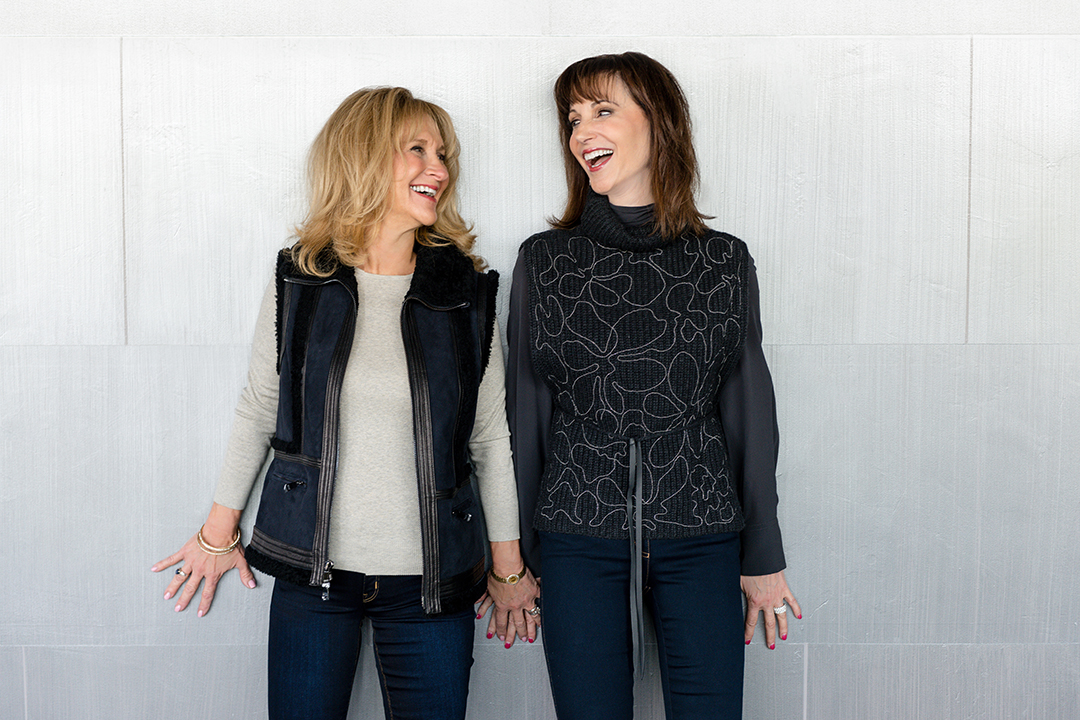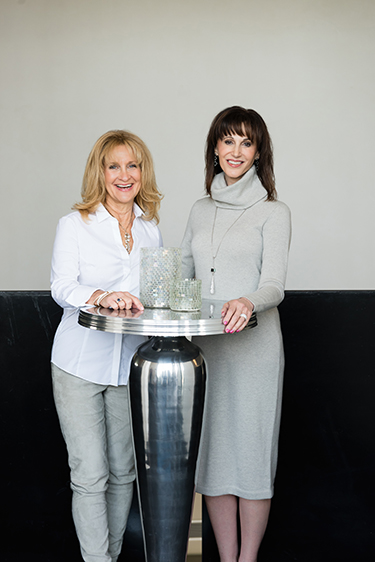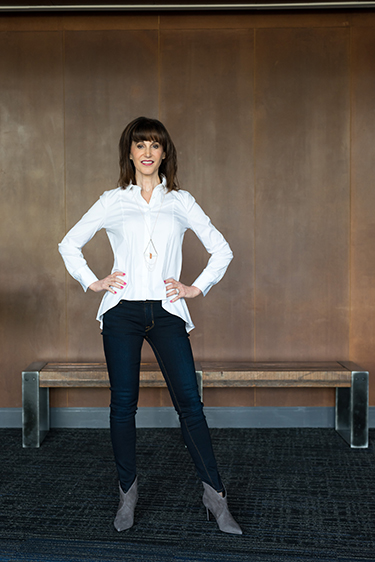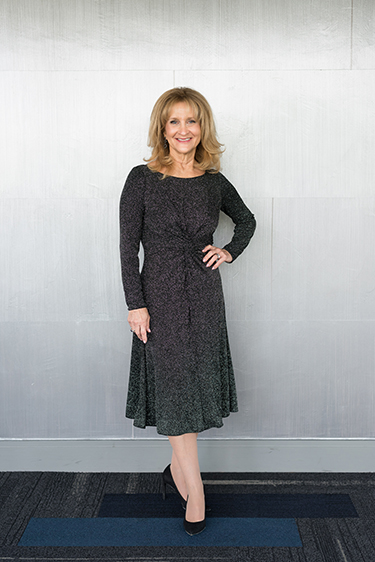Bashert: A word with multiple meanings in the creation of the Seton Breast Care Center by lifelong friends Marcia Levy and Susan Lubin.

“Keep your dreams alive. Understand to achieve anything requires faith and belief in yourself, vision, hard work, determination and dedication. Remember, all things are possible for those who believe.”
—Gail Devers
As I transcribed my interview with Marcia Levy and Susan Lubin, this quote kept repeating itself as if it were on an annoying continuous loop. I couldn’t get it to stop because this quote encapsulates the story of exactly what our intrepid cover women have done in creating the Seton Breast Care Center. Since Olympian Gail Devers’ words were so succinct and true, why not just make this the shortest cover story in the history of Austin Woman? Well, it’s because, to paraphrase famous storyteller Paul Harvey, I wanted you to know the rest of the story.
 Let me begin by warning you that should you ask Levy and Lubin if the thought ever crossed their minds that they might not succeed in their ambitious project, they will look at you like you are the one who is possibly insane. Indeed, failure was never an option, or even a thought. The need was great, the cause was noble and, together, they were determined to succeed. In their minds, once it was conceived, the Seton Breast Care Center was a done deed, far before any of the heavy lifting began.
Let me begin by warning you that should you ask Levy and Lubin if the thought ever crossed their minds that they might not succeed in their ambitious project, they will look at you like you are the one who is possibly insane. Indeed, failure was never an option, or even a thought. The need was great, the cause was noble and, together, they were determined to succeed. In their minds, once it was conceived, the Seton Breast Care Center was a done deed, far before any of the heavy lifting began.
There is a Hebrew word that perfectly defines how the friendship that resulted in a formidable pair of fundraising superstars and a state-of-the-art medical center dedicated to breast care for all Central Texas women came to be: bashert. Generally, this term refers to finding a partner for marriage or a soul mate for life, but when Levy used it in relation to herself, Lubin and the center, she explained it can also mean any fortuitous event, something preordained or inevitable, something that was meant to happen.
This tale of bashert begins with two women born within weeks of each other. Raised in Bremerton, Wash., Levy would go on to attend and receive her master’s degree in social work with postgraduate work in clinical psychology from University of Washington. Lubin grew up in Shaker Heights, Ohio, graduated from the University of Pennsylvania and taught school in Oklahoma City while her husband attended medical school. Later, she would embrace her passion for song under the tutelage of Austinite Gina Ducloux.
Although their paths would take many turns before they actually met, fate was always at work. Both are Jewish and dedicated to their faith. Both married doctors. Both have remained passionate about their accomplishments and the communities in which they’ve lived. Lubin grew up going to Palm Beach, Fla. Levy and her husband owned a home there. Acknowledging their blessings, both shared a deep commitment to giving back and making the world a better place. Both served on boards for organizations and committees for events and for their children’s schools.
“There were so many things about our friendship and our families that drew us together. It was only a matter of time before we met, and now I can’t really remember a time when we weren’t friends,” Levy says.
Eventually, the two did meet, thanks to the Junior League of Austin’s A Christmas Affair event. Having moved to Austin from San Francisco in 1982, Lubin immediately immersed herself in the community, volunteering and serving on boards and committees for organizations such as the Helping Hand Home for Children, Women’s Symphony League of Austin, the Austin Lyric Opera and the Junior League, through which she would eventually work for many years on the league’s largest annual fundraiser, A Christmas Affair. Levy, who was living in Houston, came to Austin as a vendor selling fine crystal and decorative items at A Christmas Affair. Lubin was working the fundraiser as a volunteer. There, the two began an eternal conversation, which continues to this day.
 A few short years after that fortuitous first meeting, Levy moved to Austin, and the connection grew. Today, Levy’s husband, Bruce, a medical doctor and a lawyer, manages the practice that includes Lubin’s husband, Craig, a gastroenterologist. Although their children are a few years apart, Lubin and Levy were active at both St. Andrew’s and St. Stephen’s Episcopal schools. Both were active in medical organizations and in the Make-A-Wish Foundation.
A few short years after that fortuitous first meeting, Levy moved to Austin, and the connection grew. Today, Levy’s husband, Bruce, a medical doctor and a lawyer, manages the practice that includes Lubin’s husband, Craig, a gastroenterologist. Although their children are a few years apart, Lubin and Levy were active at both St. Andrew’s and St. Stephen’s Episcopal schools. Both were active in medical organizations and in the Make-A-Wish Foundation.
Lubin’s interests run toward the arts. She was active in the Austin Lyric Opera for 17 years, serving as president of the board and performing in the chorus and in individual roles. She served as president on the Seton development board, as well as co-chairing and chairing the annual gala. She also served on the board of Zach Scott Theatre, and performed in several productions, including Ragtime.
Levy was active in the formation of the Dell Jewish Community Center, chaired the board of the Austin Anti-Defamation League, where she worked closely with Ballet Austin on Light / The Holocaust & Humanity Project, served on the board of GEN Austin and volunteered for Mobile Loaves & Fishes, and served on the boards of Austin Moviemakers and the Arts Education League.
Through the years, their friendship and their community involvement grew. Fate would step in again when Lubin received a breast-cancer diagnosis. What began with three words all women dread—“You have breast cancer.”—also put into motion a shared journey that would become a labor of love.
“When I was diagnosed, Marcia rushed to my side and stayed with me through the whole thing. It cemented our relationship and we are like sisters,” Lubin says.
“Susan likes to say that she was the friend in need and I was the friend in deed,” Levy laughs.
Unlike many women who receive such a diagnosis, Lubin, being a physician’s wife, received immediate access to doctors. She also received immediate treatment. When Lubin became aware of a small lump, it was actually too small for concern, but as the lump grew, she sensed that something was wrong and was checked immediately. Although the lump was small, a sonogram was the first course of action, followed by a lumpectomy. Because of the size of the tumor and immediacy of treatment, Lubin was pronounced cancer-free just two weeks from diagnosis. Although her prognosis was excellent, Lubin was aware she was in a group of women—Ashkenazi Jews (Jews of Eastern-European descent)—who have a higher incidence of the BRCA1/2 gene mutation and breast cancer. She chose to have a double mastectomy.
 “I was fortunate that I never had to have chemo or radiation,” Lubin says. “Although I would never advise anyone about whether or not to have a mastectomy, I felt that, for me, it was the right thing to do. Interestingly, the data shows that the survival rate 10 years out is basically the same for women who choose to have a lumpectomy and for those who have mastectomies, but, for me, it was what I wanted to do.”
“I was fortunate that I never had to have chemo or radiation,” Lubin says. “Although I would never advise anyone about whether or not to have a mastectomy, I felt that, for me, it was the right thing to do. Interestingly, the data shows that the survival rate 10 years out is basically the same for women who choose to have a lumpectomy and for those who have mastectomies, but, for me, it was what I wanted to do.”
Levy was by Lubin’s side through the entire process, including the mastectomy and reconstructive surgery, observing everything firsthand. Several months following the surgery, at a lunch meant to boost Lubin’s spirits, the pair began discussing an article they had both serendipitously read in More Magazine about a breast-care center in Philadelphia. Together, they realized there was a need for a similar state-of-the-art center in Austin. Acknowledging that she was at a crossroads in her life when Lubin announced she was going to make it her mission to build such a center, Levy jumped on board, and the Seton Breast Care Center was conceived that day.
“I looked at Marcia and said, ‘There is nothing like this in this community, and I am going to spend my time, talents and treasures to ensure that every individual in Central Texas has access to the same level of care that I did,’ and she said, ‘I am in this with you,’ ” Lubin recalls.
Levy also remembers that decision, determination and commitment.
“Professionally, I was a clinical social worker and I had worked in a hospital setting, and we are both married to medical professionals, so, we got it,” Levy says. “We recognized and identified the need. We had a good sense that there needed to be a cadre of services and programs that were multidisciplinary. It needed to be comprehensive, to take people from routine mammograms all the way to survivorship and support services for lifers (Stage 4) and their family members. This was our mission.”
“I got such incredible care that I wanted that treatment for everyone,” Lubin says. “Ordinarily, it would take a lot of time from diagnosis to treatment. I could get in the next day. Between my diagnosis and my surgery, which rendered me cancer-free, was only two weeks, and that is our goal, for everyone to be provided with state-of-the-art care with state-of-the-art caring. That is important to us. Being diagnosed with any kind of cancer is terrifying, but it is so emotional, as it involves so much of your identity as a woman. It is striking younger and younger women. The cancer is more virulent.”
Lubin and Levy toured established breast-care centers, like the Ralph Lauren Center for Cancer Care and Prevention, and the Evelyn Lauder Breast Center in New York, and pitched their idea to the president of Seton Healthcare Family Hospitals and members of the staff and board. The pair was fortunate to get in front of the decision makers, due to their husbands’ positions as physicians and Lubin’s service and connection to the Seton Development Board. Although they agonized waiting for nine months for Seton to get back with them, fate once again was on their side, as the hospital group was in the process of rethinking its oncology focus, and the Ann Butler Pavilion seemed like the logical spot for such a center. When Seton came back with the charge that in order to build the center, they would need to raise $6.5 million for construction and equipment, Lubin and Levy sprang into action, never doubting the center would become a reality.
“We developed an incredible steering committee and did a lot of face-to-face fundraising,” Levy said, “The Hickses opened their house to us for a introductory reception. Kenichi put on an amazing dinner where Ray Benson entertained and it was $500 a plate, with everything going to the center. And, of course, Michael and Susan Dell honored Craig and Susan with a $1 million donation. We also built our pink army of donors, where people could support the center with donations on all levels. The concept was that everyone could participate in building the center and, in turn, it would belong to everyone. With the help of all of those people and an amazing development director, Linda Lotz, we were on our way.”
In the end, Lubin and Levy raised more than $8 million, and in February 2014, the Seton Breast Care Center opened its doors and began providing comprehensive and personalized care for the women of Central Texas. From February 2014 to August 2015, 3,844 patients have received breast-imaging services and 5,580 patients have received total services.
According to Levy, failure was never an option.
“We never thought about that,” she says. “It all came together relatively luckily. We just kept marching and never took no for an answer. We said, ‘If the cause doesn’t resonate for someone that we approach, then we will find people who it does resonate with.’ We always knew that we could do it. The thought didn’t occur to us that it wouldn’t work. People come on board if you are committed and passionate.”
At the end of my interview, it occurred to me that this story is bashert, preordained, inevitable, meant to be so we could tell the story and some woman yet to be diagnosed may read it and benefit from the services offered at the center. Two visionary women determined and dedicated with faith in themselves and each other, two women who never stopped believing that all things were possible and that they were brought together to make a difference: bashert. I really love the sound of that word.
GET INVOLVED!
Seton Breast Care Center (seton.net/breastcarecenter) events in October are at the center, 1201 W. 38th St., first floor, unless otherwise noted.
Oct. 1: Breast Screening Lunch and Learn, noon to 1 p.m.
Oct. 1: Rally behind Breast Cancer Awareness Event, 6 to 8 p.m.
Oct. 13: Metastatic Breast Awareness Day: Meditation by Stiletto Stampede (Check the website for the specific time.)
Oct. 17: Book-signing event: Renee Sendelbach, 3 to 5 p.m.
Oct. 21: Pretty in Pink event with Avenue 5, 1 to 5 p.m.
Oct. 28: Breast Reconstruction Awareness Panel and Reception, CME and CNE credits for clinical staff, McFadden Auditorium and Seton Breast Care Center,
4 to 7 p.m. (Check the website for more details.)
Oct. 31: Benefiting the Seton Breast Care Center: Stiletto Stampede, stilettostampede.org
March 29, 2016: Save the date! Celebration of Life Luncheon in collaboration with Zeta Tau Alpha. celebration.austin.zetataualpha.org
THE SETON BREAST CARE CENTER
What if you could go to a place that more closely resembled a spa than a medical facility to receive comprehensive care, beginning with mammograms and culminating with treatment for all of your breast-care needs? How would you like to be welcomed to a place with a lobby that looks like it came out of a designer’s handbook, boasting a shining, black grand piano, beautiful artwork and comfortable furniture? Once inside, would you like to be treated to soothing tea, a warm robe and a private dressing room, then ushered to a comfortable waiting room filled with the sounds of the ocean while you rest on comfy chairs? Might that alleviate some of the anxiety you may feel, even when going in for a routine mammogram?
If you answered yes, you will be pleased to know this was all in the plan for the Seton Breast Care Center when founders Marcia Levy and Susan Lubin created this very unique atmosphere and state-of-the-art center. It definitely lives up to its motto: A place with state-of-the-art care and state-of-the-art caring. The founders also like to say the center is a place where hope takes flight, an idea symbolized by butterfly art spread throughout the center.
Services offered:
A multidisciplinary approach and personalized treatment are the hallmarks of the center.
Imaging: Understanding that early detection helps ensure the best outcomes for treatment and survivorship, the center provides state-of-the-art imaging technology and a wide variety of imaging services, including digital 3-D mammography (Read about my personal experience at austinwoman.com.), stereotactic breast biopsies, breast sonography, bone-density scanning and breast 3T MRIs. Mammograms can be scheduled online at seton.net/mammo, by phone at 512.324.1025 or simply by walking in on weekdays.
Support Services: Access to community counseling, nutrition classes, Boob Camp postoperative exercise classes Tuesdays at 7 p.m. and Saturdays at 8 a.m., dietary counseling, pre-operative education classes, patient and caregiver workshops, outreach/education and empowerment events, psychological counseling and support groups.
Patient Navigation and Treatment Services: The center offers specially trained nurse oncologists who support patients through the entire process, from diagnosis to treatment to support for recovery and survivorship. These patient navigators provide patient education and facilitate access to resources, such as physical therapy, social work, nutrition and spiritual consultations.
The center facilitates access to treatment planning provided by multidisciplinary cancer conferences held in conjunction with Seton’s Cancer Center Collaborative. This allows a wide range of professionals to collaborate on treatment plans and to review each patient’s case collaboratively. The Cancer Center Collaborative also allows access to physicians and health-care professionals for long distance/remote access collaboration via teleconferencing.
Additional Services:
- Lymphedema therapy. For those patients who have been surgically treated, the center offers this therapy, which includes massage, bandaging, exercise and skin care, all managed by a trained therapist.
- Resource library. This includes a wide range of materials pertaining to breast cancer and treatment, as well as information on local and national support groups and organizations.
- Boutique. The center offers a recovery-garment boutique, which includes clothing and accessories created especially for breast-cancer patients.
- Mobile Mammography. The Big Pink Bus provides mammography services to the underserved, as well as the uninsured. The Big Pink Bus also provides convenient corporate outreach and employee breast screenings.
For more information about services offered at Seton Breast Care Center, visit seton.net/medical-services-and-programs/cancer-care/mobile-screening-mammography-services.

